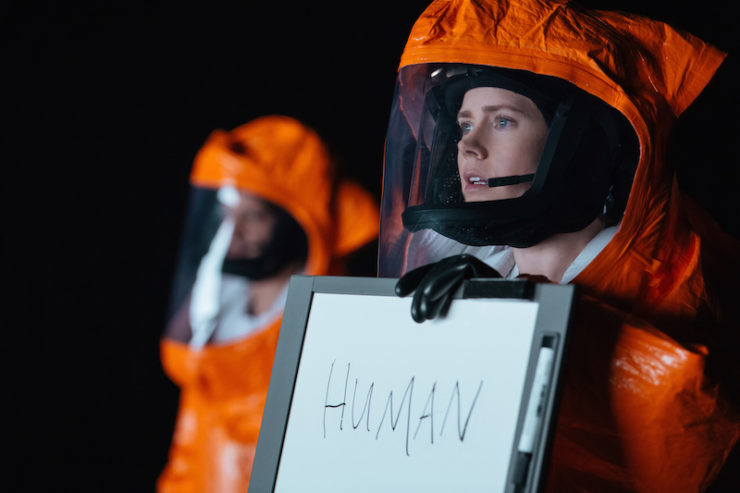I’m no veteran of film festivals—and indeed, I only started going to Austin’s Fantastic Fest last year. But if it ends up being the only film festival at which I’m a regular, I’m fine with that. It’s a “genre” festival, a term which encompasses high-profile fantasy like Miss Peregrine’s Home For Peculiar Children (complete with Tim Burton on the festival red carpet), sensational (if not SFnal) art films like Park Chan-wook’s The Handmaiden, a surprise screening of M. Night Shyamalan’s SPLIT, and some magnificently disreputable midnight movie trash from all over the world. This year also featured horror short films presented as VR experiences, a “Satanic Panic Escape Room,” and the FF traditional evening of debates settled by fisticuffs at a local boxing gym.
And, yes, well, it happened over a month ago, didn’t it. You may be wondering why I’m only just now getting around to writing about more of the films I saw. Well, when Fantastic Fest 2016 kicked off, I was 37.5 weeks pregnant. The weekend after it ended—the weekend that I originally had planned to use to catch up on my reviews—the baby arrived a week ahead of schedule. So I’ve been a little busy since then.
It would probably take another month altogether to write complete reviews for every film that I saw, so for now I’m going to stick to a few specific highlights. I’ll start with Denis Villeneuve’s Arrival, which opened the festival and which launches nationwide this weekend.
Tor.com readers are undoubtedly well aware that Arrival is adapted by Eric Heisserer from Ted Chiang’s novella Story of Your Life and if you’ve read that story, you’ll know what you’re getting into. If not, I recommend avoiding as much information in advance as you can manage—possibly even the remainder of this review, though I’ll try to be as circumspect as possible. If you read no further for now, suffice it to say that Arrival is an outstanding film—intelligently made and acted, deeply moving, and possibly requiring a full box of Kleenex, especially if you’re a parent. Arguably, it’s the film that Interstellar was trying to be before it faltered under its own weighty efforts.
Arrival’s opening is as emotionally bruising as that of Up (even more so, perhaps, to an expectant mother; I can’t pretend to be particularly objective about this). We see the birth of a daughter to linguist Dr. Louise Banks, glimpse fragments of their life together, and then watch the teenage daughter’s death from a terminal illness. Memories of her daughter continue to haunt Louise while she is recruited to communicate with aliens that have set up camp in enormous ovoid spaceships all over the earth. Louise and scientist Ian Donnelly (Jeremy Renner)—both exuding a sort of nerdy Everyperson charm—slowly establish a rapport with two of the heptapods, who Ian nicknames “Abbott and Costello.” Louise and Ian begin to learn the aliens’ unique written system of language, trying to establish enough of a common vocabulary to identify the the purpose for visiting Earth. Meanwhile, governments and individuals grow increasingly antsy and certain—absent any real evidence—that the aliens pose a threat, thus creating a ticking clock against which Louise and Ian must race to prove that the heptapods’ intentions are peaceful.
In a Q&A after the Fantastic Fest screening, screenwriter Heisserer pointed out that this conflict didn’t exist in Chiang’s original story. It makes for better cinema, perhaps, but it may be the most uninterestingly conventional element in the film. To the filmmakers’ credit, they evade many clichés—for instance, Col. Weber (Forrest Whitaker), the military officer leading the American contact mission, is Louise’s ally, where in a lesser film he would have been the primary antagonist. But the increasingly urgent “are they hostile, and if so do we strike first” plot concludes via a device that got laughter from one FF audience and applause from another. On the other hand, it may be unfair to complain about deus ex machina in a story that hinges on a synthesis between the Sapir-Whorf hypothesis and the non-linearity of time.
It’s in the subtleties around language and time that Arrival is at its finest. Louise’s story is not entirely as straightforward as the first fifteen minutes of the film might suggest, and the truth is revealed with considerable skill and delicacy. Heisserer wryly noted that his adaptation was called “execution-dependent” by studio executives, which is another way of saying that without top-notch filmmaking, the movie would probably crash and burn spectacularly.
Luckily, Denis Villeneuve—who sent his regrets to Fantastic Fest, saying that he was busy “making a movie about the future”—is a director with a solid grasp of science fiction, the craft of film, and the intricacies of character. He builds the world of the film with small details and just the right amount of information dumps as needed, and the story’s surprises come as revelations, not cheap twists.
It seems strange to say about a film of this scale, but in a way, Arrival sneaks up on you with its power and its excellence. Perhaps the sheer nerdiness of its premise disarms you for a while there, despite the wrenching opening sequence. The question of whether Louise and Ian will beat the itchy military trigger fingers of the world, predictable though it may be, is a familiar cinematic story that might lull you into thinking you know what kind of movie you’re watching. And then in the third act, Arrival hits you with something extraordinary about love, free will, and what it means to have a child. And in a climate where public discourse is increasingly shaped by fear and xenophobia, it’s truly wonderful to see a film that prizes communication and mutual understanding. For all these reasons, Arrival is easily one of the year’s best films. Don’t miss it.
Karin Kross lives and writes in Austin, TX. She may be found elsewhere on Tumblr and Twitter.










